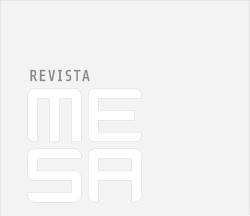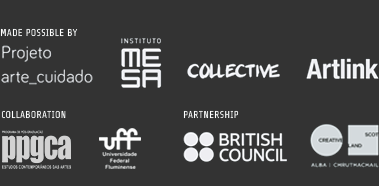Overview
Revista MESA
Revista MESA is a bilingual (English and Portuguese) digital periodical published biannually by Instituto MESA. The magazine explores the complex interchanges between art and society with a particular focus on contemporary ethical and aesthetic paradigms and practices that traverse the fields of art, curatorship and education. Featuring critical articles, “think piece” contributions, Brazilian and international case studies, videos, interviews and photographic essays, MESA presents critical reflections on art and society that draw on the experience of professionals working in the field–artists, curators, educators, researchers, and activists–and on research from a broad range of disciplines: art history, Latin American studies, museum studies, education, anthropology, sociology, geography, and philosophy. With a national and international circulation MESA seeks to be a catalyst and conduit for dialogue exploring contemporary critical and creative practices in their distinct contexts, formats and situations. Revista MESA editors: Jessica Gogan and Luiz Guilherme Vergara with guest editors, contributing authors and collaborators on each issue.
Nº 1. Territories and Practices in Process
February 2014
Territories are defined by their practices; and in turn, practices are embodied in their territorializations–moments of instantiation amidst the daily flux. The material gathered for this first edition explores this complex and mobile territory within the areas of contemporary art, curatorship and education. Critic and scholar Tania Rivera was invited to contribute a “think piece” to accompany this edition exploring these shifting territories and practices, in which she explores the poetic resonance of art in the world and the importance of a curatorial, critical and pedagogical practice of dispersion and dissemination.
In two International case studies German curator Claudia Zeiske describes the town as venue practice of Deveron Arts. Portuguese curator Nuno Sacramento, born in Mozambique, provokes a political discussion about the production of a new common through his Makers ‘ Meal project that brought together artists and artisans to create a dinner–including the tables, plates and cutlery as well as food. The two projects, both occurring in the northeast of Scotland, speak to the vitality of contemporary art in rural contexts.
Two additional national case studies, explore the public life of art and the experience that art inaugurates as a richly emergent critical and creative field in itself: an edited selection of interviews with curators, artists, participants and educators involved in the geopoetic world of the 8th Biennial of Mercosul, Porto Alegre and essays reflecting on the experiences visiting Ernesto Neto’s The Animal SusPensiveIntheLandGenscape with different audiences.
These contexts also offer new artistic horizons and poetic practices re-imagining and mining practices of caring and healing such as the collaborative process between Brazilian artist José Rufino and Alzheimer patients–part of an exhibition and an artist residency at The Andy Warhol Museum in the US–discussed in an article in this issue.
In addition to these artistic and curatorial shifts a video interview with Jailson de Silva e Souza, director of the Favela Observatory in Rio de Janeiro, shows the importance of adopting new critical lenses and ways of thinking about the city as a creative and pedagogic territory. In another, yet entirely different popular context, the photographic essay by Leonardo Guelman, which captures The House of Miracles, shows the vitality of the folk religious world of people in northeastern Brazil.
Collaborators/Contributors No.1: Anita Sobar, Bernardo Zabalaga, Bianca Bernardo, Claudia Zeiske, Ernesto Neto, Imagens de Povo, Jailson de Souza e Silva, Jessica Gogan, José Rufino, Leandro Almeida, Leonardo Guelman, Luiz Guilherme Vergara, Nuno Sacramento, 8ª Bienal do Mercosul, Tania Rivera, e Virgínia Kastrup.
Collaborators/Contributors No.1
Nº2. Poetic Spaces = Ethical Languages: Diverse Practices in Latin America
April 2015
The second edition of Revista MESA explores conceptual resonances that are part of an unfinished and open critical discussion that engages in the expansive possibilities of the aesthetic at the service of the ethical.
As Fred Coelho’s provocative think piece suggests the themes and practices at play in this issue emphasize a quest for “how to live together”. In the case studies, Angela Carneiro introduces the reader to the outreach course called the University of Quebrada and points to the vital flow of affection that simultaneously mobilizes and enables the creation of a lived cartography of encounters, driftings and multiple crossings and circulations of the city. Felipe Moreno writes about René Francisco, who leaves the studio and the classroom and moves into the “real world,” creating collective interventionist actions with his students. Argentine collective Ala Plástica describes their environmental and bioregional activism with initiatives that engage communicative strategies and actions connected to social contexts that sharply contrast with modernist ideologies of art’s neutrality. And Roberta Condeixa sketches the micro-utopias made possible by Juan Manuel Echavarría in his therapeutic painting laboratory of existential recovery and release together with former guerrillas of drug trafficking in Colombia.
The video interview for this edition features the artist Carlos Vergara who, with his constant practice of dislocation and world travel, enacts a unique creative gesture of reverence and (in)vocation to the singularities that inhabit each place where the artist is a kind of “supporting actor”.
Peripheries are not only urban, but also of the natural world. Guilherme Vaz brings us to a Niterói Atlantic forest in the state of Rio de Janeiro, once traveled by Charles Darwin, evoking other margins, indigenous peoples and cultures, and an environmental consciousness. His sound performance with rattles inaugurates a ceremonial symbology of an “acontecer solidário” (happening in solidarity) between indigenous sounds and contemporary rituals produced simultaneously with the experience.
Finally, with the collaboration of 30 artists and researchers from various regions in Brazil, Cristina Ribas’ political vocabularies projects proposes a network of new transversal vocabularies to navigate and reinvent our place in the world.
Collaborators/Contributors No.2: Ala Plástica, Angela Carneiro, Beá Meira, Carlos Vergara, Chloé Le Prunennec, Cristina Ribas, Daniel Leão, Felipe Moreno, Frederico Coelho, Guilherme Vaz, Jessica Gogan, Juan Manuel Echavarría, Leandro Almeida, Luiz Guilherme Vergara, Noélia Albuquerque, René Francisco Rodríguez e Roberta Condeixa.
Collaborators/Contributors No.2
Nº3. Publicness in Art
May 2015
We see this third issue of Revista MESA as a magazine-as-process, an ecosystem of voices and writings, words and images, practices and politics that call out for global alternatives and new forms of publicness.
Peter Pál Pelbart initiates this web, associating the contemporary human being with the spider, in turn, intersecting with Rodrigo Nunes’ political practice of “counterpimping” and Danilo Streck’s reconfiguration of the public, then crisscrossing with the moving and poignant embodiments of the Brazilian 2013 protests captured in the film by the collective ¡NoPasaran!.
A specially expanded volume of the magazine, this issue highlights three national case studies with essays, videos, reflections, and testimonials resulting from the traveling project Publicness in Art, made possible by a grant award from the 10th edition of Redes de Encontros nas Artes Visuais (Networks of Encounters in the Visual Arts) of Brazil’s national art foundation, Funarte. The project held encounters in three distinct regions and cultural ecosystems of Brazil: Rio de Janeiro, Porto Alegre in the southern state of Rio Grande do Sul, and Juazeiro do Norte, Cariri, in the north eastern state of Ceará. Cultural imaginaries and sensibilities were interwoven with geopoetic and regional singularities. There was no way to discuss publicness in art without exploring the diversity of contemporary Brazilian culture.
This web of insights is also cross-cultural with the inclusion of two international case studies. Four cardinal points of continental distance, yet also of ethical proximity, come together in this issue. Adversity and poetic resistance are threads that interweave practices from Cariri in Brazil’s northeast to the country’s extreme south in the state of Rio Grande do Sul, and from Johannesburg in South Africa to Glasgow in Scotland.
Collaborators/Contributors No.3:
Alex Hetherington, Anthony Schrag, Barbara Szaniecki, Bia Jabor, Brian Hartley, Chloé Le Prunennec, Daniel Leão, Danilo R. Streck, Diana Kolker Carneiro da Cunha, Emma Balkind, Eugenio Valdés Figueroa, Felipe Moreno, Hans K Clausen, Jessica Gogan, José Rufino, Katie Bruce, Leandro Almeida, Leonardo Guelman, Luiz Guilherme Vergara, Mônica Hoff, Mysterious Creatures Dance Fusion, ¡NoPasaran!, Nuno Sacramento, Peter Pál Pelbart, Rafa Silveira [Rafa Éis], Rangoato Hlasane, Roberta Condeixa, Rodrigo Nunes, Sarah Barr e t s Beall.
Collaborators/Contributors No.3
Nº4. Past as Blueprint
Hybrid Practices/Limit Zones
May 2015
This edition of Revista MESA brings together critical reflections that draw on inspirational histories as vital contemporary touchstones. The subtitle of “Hybrid practices and limit zones” further hones this issue’s focus on forms of social practice – artistic, pedagogic, activist, collective – that challenge art/life and elite/democratic divides, particularly operative in critical cultural hinge moments such as the turn of the 20th century and, more recently, the 1960s/70s.
Edson Sousa in this issue’s Think Piece points to the border zone where art inserts itself to “block our certainties” and puts forth the notion of utopia as a potential eclosion of a linear sense of time, a movement that goes from the future to the past, a current against reality.
This counterflow of the future resonates with each narrative in this issue. In her photo essay Graciela Carnevale shares a selection of images from her archive of the radical experiments of the Argentine Artistic Vanguard Group and their collective projects Tucumán Arde and Experimental Art Cycle, in Buenos Aires and Rosario in 1968.
Two national case studies are presented. Rubens Gerchman: With the Resignation Letter in My Pocket and the Contemporary Laboratory at Casa Daros explores the years when the artist was director of Rio de Janeiro’s School of Visual Arts, Parque Lage (1975-1979) and a recent experimental course aimed at young artists inspired by this time period – Contemporary Laboratory: Proposals and Discoveries of What Art Is (Or Can Be). The second case study features the work of the Experimental Nucleus of Education and Art at the Museum of Modern Art Rio de Janeiro (MAM), active between 2009 and 2013, and explores experimental parallels in MAM’s history.
The international case studies are from USA and Chile. John Dewey and Jane Addams became historical touchstones for curators Mary Jane Jacob and Kate Zeller and their multifaceted project A Lived Practice, comprising exhibitions, publications and commissioned projects that mined the legacy of these activist histories for a new generation of practitioners in Chicago. In Santiago, Claudia Zaldivar narrates the 34-year history of the Museo da la Solidaridad Salvador Allende and its genealogy of hope and struggle.
In his article on free universities Sergio Cohn briefly sketches the history of anarchist-inspired schools in Brazil and explores contemporary projects such as Universidade Nomade that share rich parallels with these early 20th century “free” university ideals.
This issue’s video interview features an exploration of the legendary project The Model: A Model for a Qualitative Society at Moderna Museet in Stockholm in 1968 and The New Model: An Enquiry, a research project initiated by Lars Bang Larsen and Maria Lind in 2011, that investigates the legacy of The Model via a series of exhibitions, seminars and artist commissions.
Collaborators/Contributors No.4:
Beatriz Coelho, Bia Jabor, Chloé Le Prunennec, Clara Gerchman, Claudia Zaldivar, Daniel Leão, Diana Kolker Carneiro da Cunha, Edson Luiz André de Sousa, Gabriela Gusmão, Graciela Carnevale, Gunilla Lundahl, Jessica Gogan, João de Albuquerque, Kate Zeller, Lars Bang Larsen, Luan Machado, Luiz Guilherme Vergara, Magnus Bärtås, Mara Pereira, Maria Lind, Mary Jane Jacob, Michel Schettert, Palle Nielsen, Raphael Giammattey, Sabrina Curi and Sergio Cohn.
Collaborators/Contributors No.4
_
The first four issues of MESA magazine are funded by the Prêmio Procultura de Estímulo às Artes Visuais 2010 Funarte/MinC (Brazilian Ministry of Culture National Art Founcation Pro-cultural Incentive Prize for the Visual Arts).



